
- Home
- India
- World
- Premium
- THE FEDERAL SPECIAL
- Analysis
- States
- Perspective
- Videos
- Sports
- Education
- Entertainment
- Elections
- Features
- Health
- Business
- Series
- In memoriam: Sheikh Mujibur Rahman
- Bishnoi's Men
- NEET TANGLE
- Economy Series
- Earth Day
- Kashmir’s Frozen Turbulence
- India@75
- The legend of Ramjanmabhoomi
- Liberalisation@30
- How to tame a dragon
- Celebrating biodiversity
- Farm Matters
- 50 days of solitude
- Bringing Migrants Home
- Budget 2020
- Jharkhand Votes
- The Federal Investigates
- The Federal Impact
- Vanishing Sand
- Gandhi @ 150
- Andhra Today
- Field report
- Operation Gulmarg
- Pandemic @1 Mn in India
- The Federal Year-End
- The Zero Year
- Science
- Brand studio
- Newsletter
- Elections 2024
- Events
‘Children of Harijans' in Assam are unlocking the power of education for dignity

In a corner of Tezpur, known as the cultural capital of Assam, lies a Harijan colony where approximately 1,500 residents live in difficult conditions. Most adults in this community work as sanitation workers, and like many others in India, they belong to the Dalit community. Their struggles are compounded by poverty and a lack of basic facilities such as toilets, clean drinking water, and...
In a corner of Tezpur, known as the cultural capital of Assam, lies a Harijan colony where approximately 1,500 residents live in difficult conditions. Most adults in this community work as sanitation workers, and like many others in India, they belong to the Dalit community. Their struggles are compounded by poverty and a lack of basic facilities such as toilets, clean drinking water, and a proper drainage system. Additionally, they face social exclusion imposed by upper-caste Hindus, which has confined them to a marginalised existence since time immemorial.
However, over the past decade, the youth of the Harijan colony have been striving to change the status quo that has persisted for generations. They firmly believe education is the key to escaping poverty, exclusion, and stigma. Sixteen-year-old Richa Basfore is one of them. The teenager excelled in her class ten board examinations last year, achieving over 80 per cent in all subjects. She is currently pursuing her class eleven studies in the commerce stream.

Richa Basfore, the star student from Tezpur's Harijan colony, who excelled in her studies.
“I am glad I did well in my board examinations. Achieving good grades requires a lot of dedication and hard work. I studied for six hours daily at home after school because I wanted to make my parents and my community, the people in the Harijan colony, proud. My success belongs to all of them,” the 16-year-old said.
Also read | A Muslim woman jailer in Assam's oldest jail and the road to reformation
Richa’s dedication and hard work were further elaborated on by Kushi Basfore, an 18-year-old student pursuing her 12th grade in the arts stream at Darrang College in Tezpur. Kushi lives just two lanes away from Richa and told The Federal, “There is no conducive atmosphere for studying here. It is quite chaotic. People often play loud music and gather outside each other’s homes to talk and discuss life in general. I am not complaining; this is our culture. We are like one big family here, just separated by thin walls.”
“We don’t have a stable electricity connection. Power outages are frequent, which disrupts our study hours in the evening. Moreover, there is no regular water supply here; we rely on water provided by tankers. There are only four toilets for more than 1,500 people, making it difficult to maintain proper sanitation and hygiene,” Kushi added.
Like Richa, Kushi is determined to complete her education despite facing numerous challenges. “The biggest challenge is our financial situation. My father is a daily-wage worker, and he has decided against doing sanitation work like my grandparents did. He earns between Rs 300-400 a day. Our family consists of six members: my three younger siblings, my parents, and me. My mother is a homemaker, so we must live, eat, and pursue our education on my father's limited income,” Kushi said.
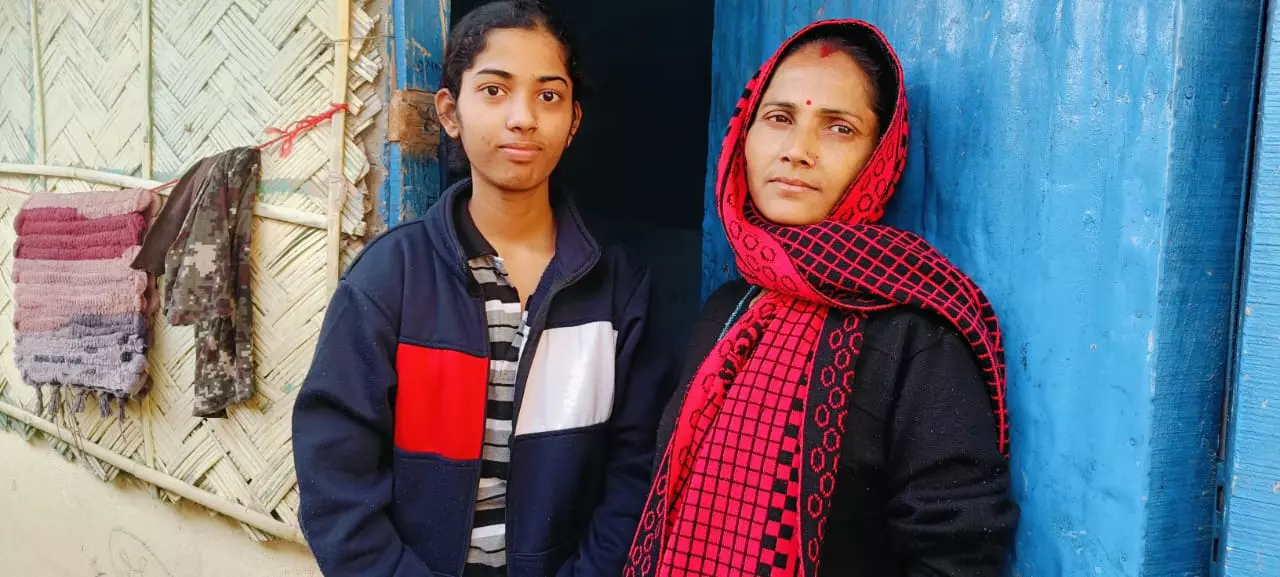
Kushi Basfore (left) poses with her mother, Gunja (right), outside their house.
Despite all these challenges, Kushi has plans for her future. She aspires to become an entrepreneur and work with underprivileged women to empower them. “I want to make the best use of my education,” she smiled.
As one moves from one house to another, whether constructed of bamboo or concrete and covered with rusted tin roofs, the “education of children” emerges as a top priority. Families, particularly the grandparents, take great pride in the fact that the younger generation in the community is attending school. Most individuals over the age of 50 have never received an education.
Also read | Pollution and self-purification of Ganges
Biju Basfore, 50, a sanitation worker for the municipal corporation in Tezpur, said, “We are all unlettered.” When he referred to “we”, he meant himself and his wife. He has four sons whom he sent to school, but they did not complete their education because they were unaware of its importance. Moreover, education comes with significant costs that they could not afford.
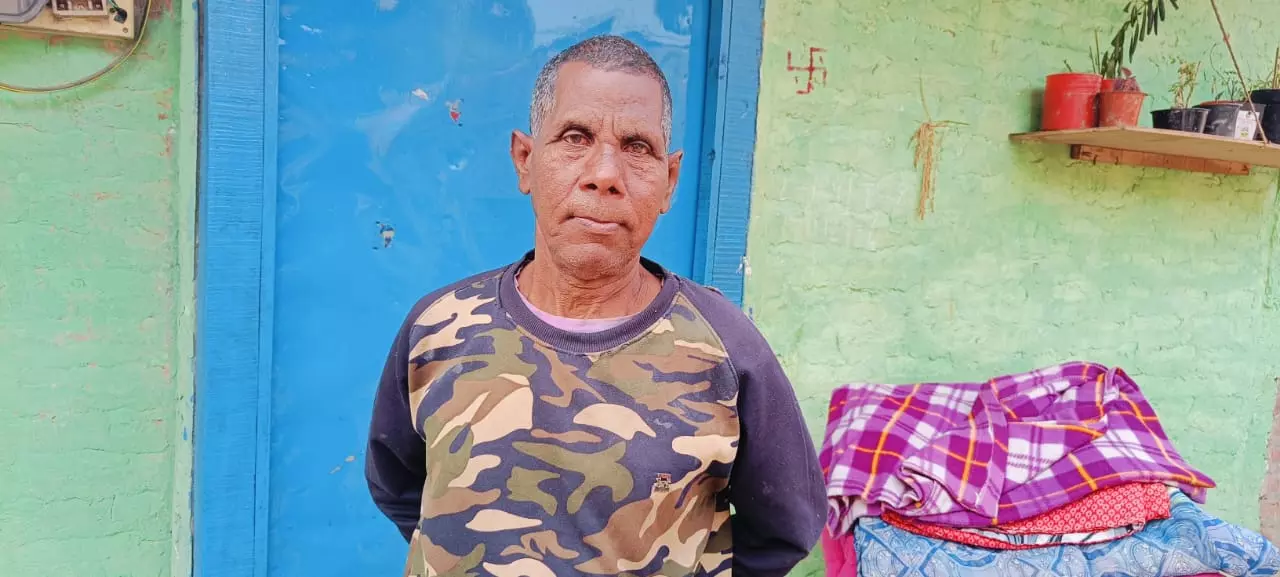
Biju Basfore, 50, a sanitation worker at the municipal corporation in Tezpur.
Before entering the colony, there is the Harijan Hindi Lower Primary School, Tezpur. Locals mention that the school lacks basic infrastructure, yet many children from the community study there. Some parents also choose to send their children to private English-medium schools.
“These days, we are making sure that all the children go to school. Some parents, in their late 20s and 30s, who had to drop out of school themselves, are doing their best to send their children to English-medium schools despite financial difficulties. We don’t want to miss the opportunity for education,” said Mintu Basfore, 30, who recently opened a food cart. Mintu is a graduate who, after working various jobs, including as a salesperson in local supermarkets, decided to become an entrepreneur.
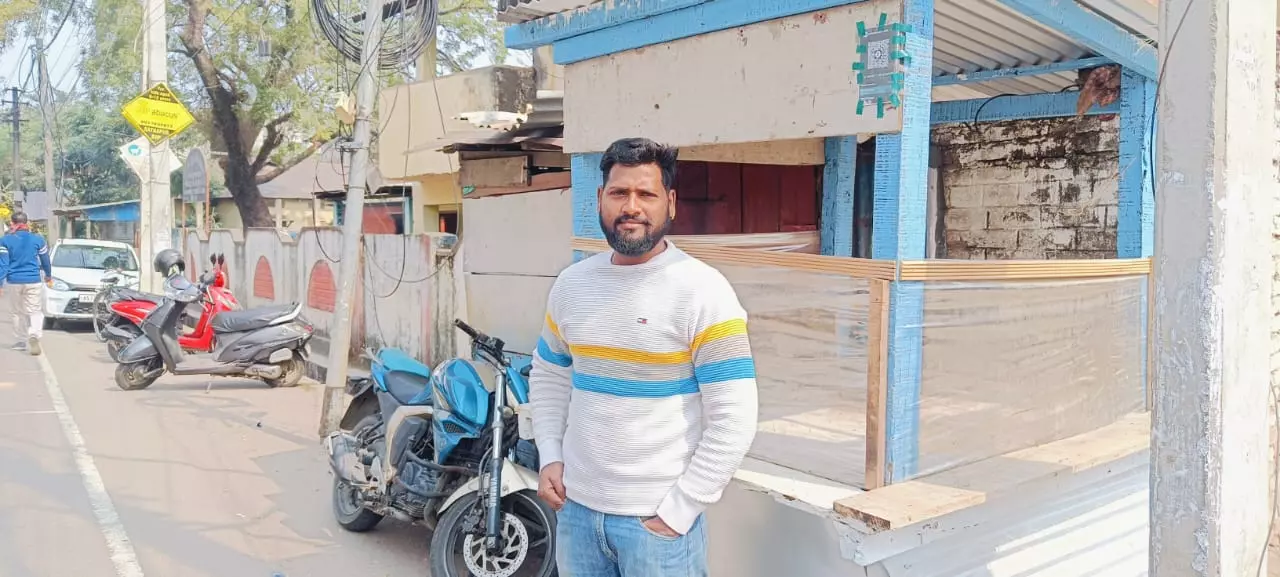
One of the few graduates from Tezpur's Harijan colony, Mintu Basfore, 30, has recently opened a food cart.
The colony was established by the British in 1826 and was known as a coolie or labourer depot during the colonial rule, as workers from Bihar, Jharkhand, and Chhattisgarh were brought in and settled in the area.
Assam has several Harijan colonies in various cities and towns. Guwahati, known as the gateway to Northeast India and the largest city in the region, is home to 22 Harijan colonies. Most of these colonies were established in the early 19th century during the British regime. The residents of these colonies belong to the Dalit community and primarily engage in caste-based work, particularly cleaning and sanitation. In fact, across the country, the majority of the sanitation workforce consists of Dalits, who are classified as Scheduled Castes. According to the 2011 Census, the population of Scheduled Castes in Assam is 2,231,321, which is approximately 7 percent of the state's total population.
“For more than two centuries, people living in Harijan colonies across Assam have been responsible for cleaning our cities and towns. This situation represents one of the worst forms of caste-based subjugation. They clean dirty toilets, drains, medical waste, and dust-filled roads, often receiving meager wages for their work, which keeps them in poverty for generations.
“Moreover, they are labelled as 'dirty' and 'untouchable' because they handle all the mess, allowing the rest of society to remain clean and free of diseases,” Kasturi Lalbegi, 46, said. Lalbegi's father, Bhupen, grew up in Tezpur's Harijan colony. He was the first from the colony to complete his education.
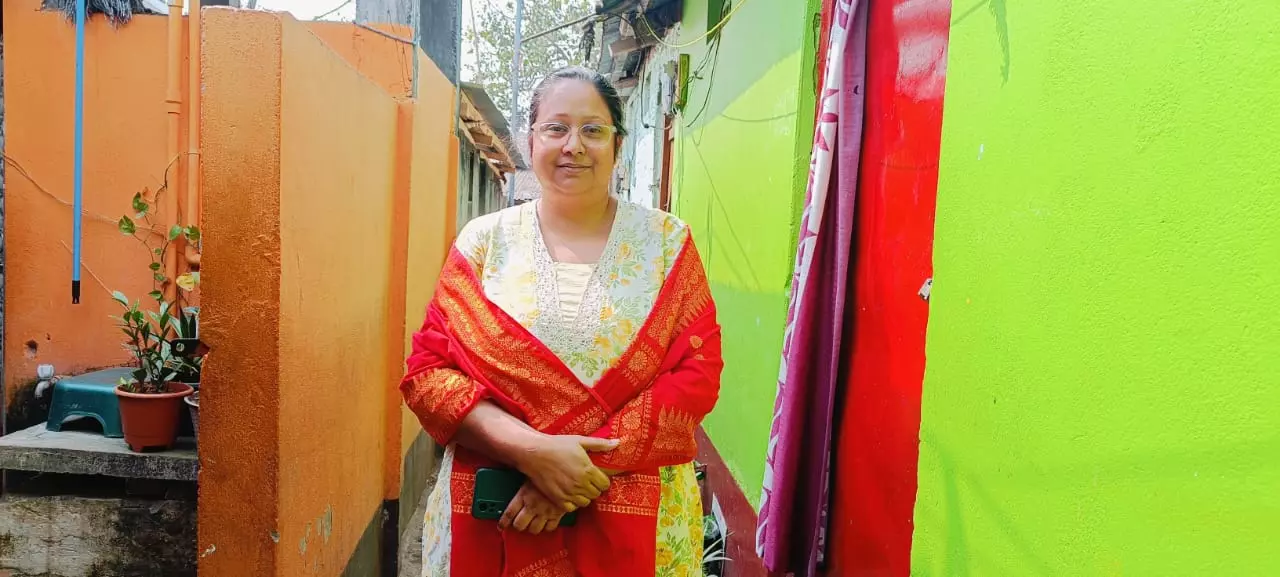
Kasturi Lalbegi's father, Bhupen, grew up in Tezpur's Harijan colony.
“When I look back, I wonder how he achieved that so many decades ago. He was determined to escape a life of poverty and stigma. I am proud to be his daughter. He retired as a senior bank official,” she said.
The bank official passed away at the age of 62 in 2016. Still, whenever his daughter visits the colony, the residents greet her warmly and embrace her, referring to her as Babu's (Bhupen's) daughter.
“Those are my roots. My father is an inspiration for others in the colony. He showed them that education can significantly change lives,” said the 46-year-old, who has obtained her master's degree in Assamese.
Many residents of Tezpur's colony have expressed that, despite obtaining an education, they face social rejection due to the stigma associated with being sanitation workers, which leads to them being perceived as “dirty”. Mintu Basfore, the 30-year-old who has opened a fast food stall, shared that his clientele primarily consists of people from the colony.
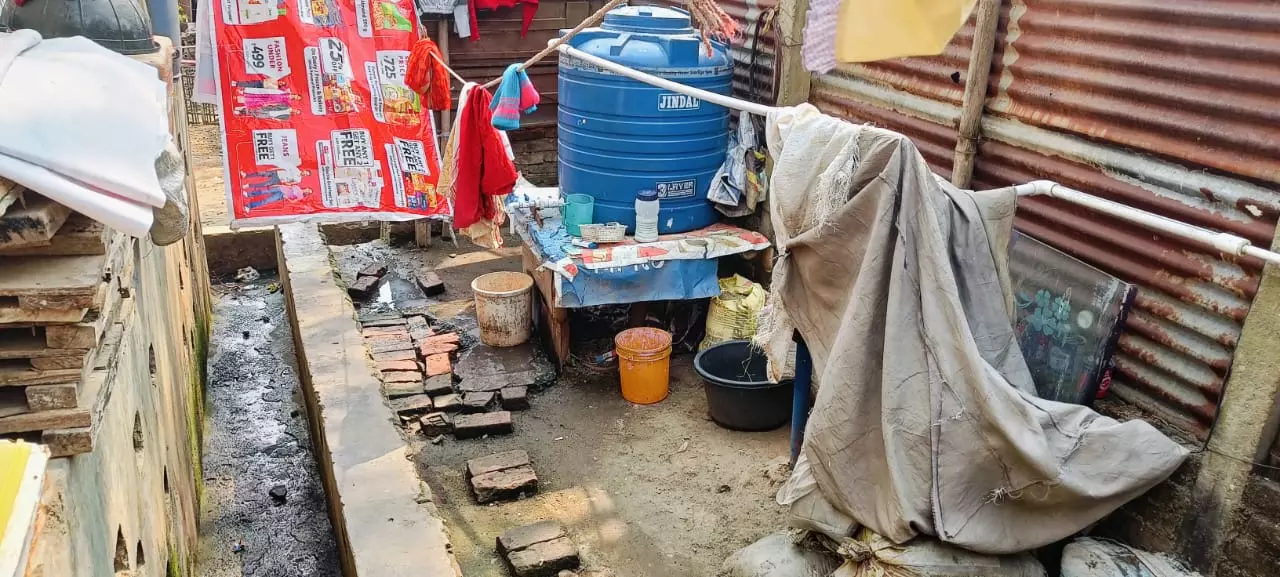
Basic facilities such as enough toilets, clean drinking water, and a proper drainage system are missing at Tezpur's Harijan colony.
“I run my food stall in the evenings, and most of my customers are from the colony. Others don’t come here to eat. My stall is situated right outside the colony entrance, so it’s clear that I am from the Harijan colony. If this isn't discrimination, then what is?" he asked. Mintu recalled that during his school and college days, students from the "upper caste" refused to sit with them, the “children of Harijans”. "No matter what we do, we are never seen as equals by others. But we are self-sufficient and proving that to the world," said the 30-year-old.
Anuj Basfore and Angad Basfore, two teenage friends from the colony, are busy playing cricket after school. "They play really well. I hope they get to play at the state level one day. They are being trained by a coach," said Bicky Basfore, 34, a sanitation worker. Both Anuj and Angad aspire to become cricketers and play professionally.

Anuj Basfore (right) and Angad Basfore (left), two talented cricket players from Tezpur's Harijan colony.
Jay Basfore, 11, loves mathematics the most at school. At home, he spends hours creating clay figurines. "I want to be an artist," he said.
An official from the Directorate of Welfare for Scheduled Castes and Backward Classes in Assam mentioned that several social welfare schemes benefit the community. “These include financial aid for terminally ill patients and merit-based support for girl students. We acknowledge that there is a significant gap between policies and their implementation. We also need to create awareness among people to help them avail these benefits,” the official stated, preferring to remain anonymous.
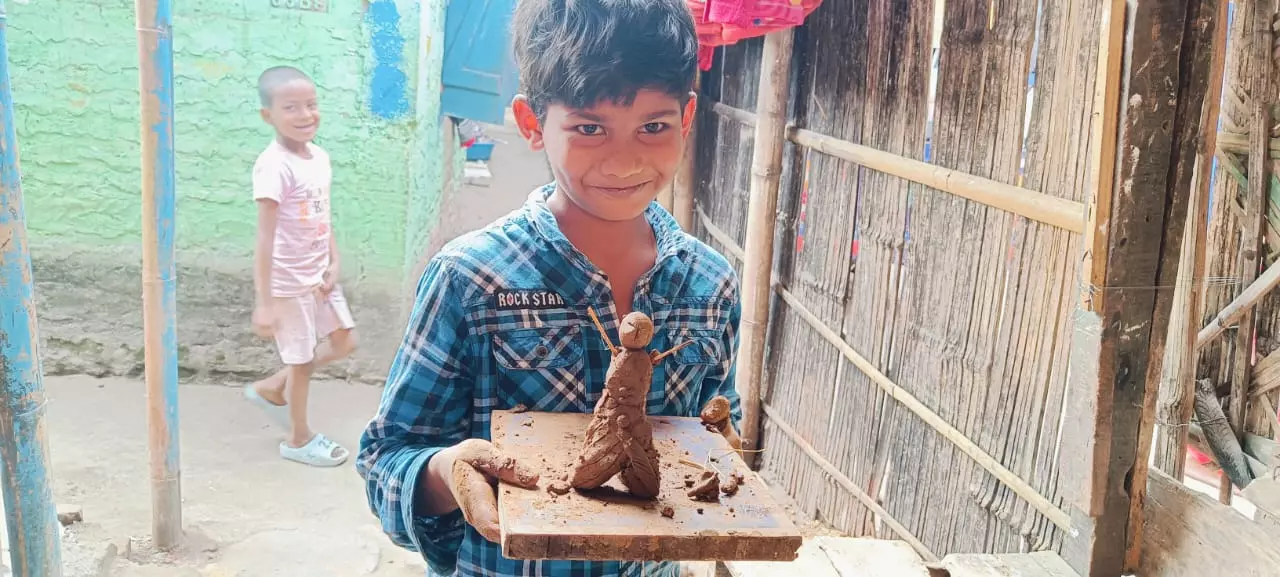
Jay Basfore, 11, spends hours creating clay figurines.
However, a Guwahati-based activist and member of the Safaikarmi Anusuchit Jati Students Union, which advocates for the rights of sanitation workers, said that the government is not supporting these workers adequately. “What else can explain the fact that so many sanitation workers still do not have permanent jobs in the municipal corporation? They earn a meager salary of Rs 8,000-10,000. After retirement, they do not receive a pension. Given the hazardous nature of their work, many become infected with diseases like tuberculosis, and many do not live past their 50s.”
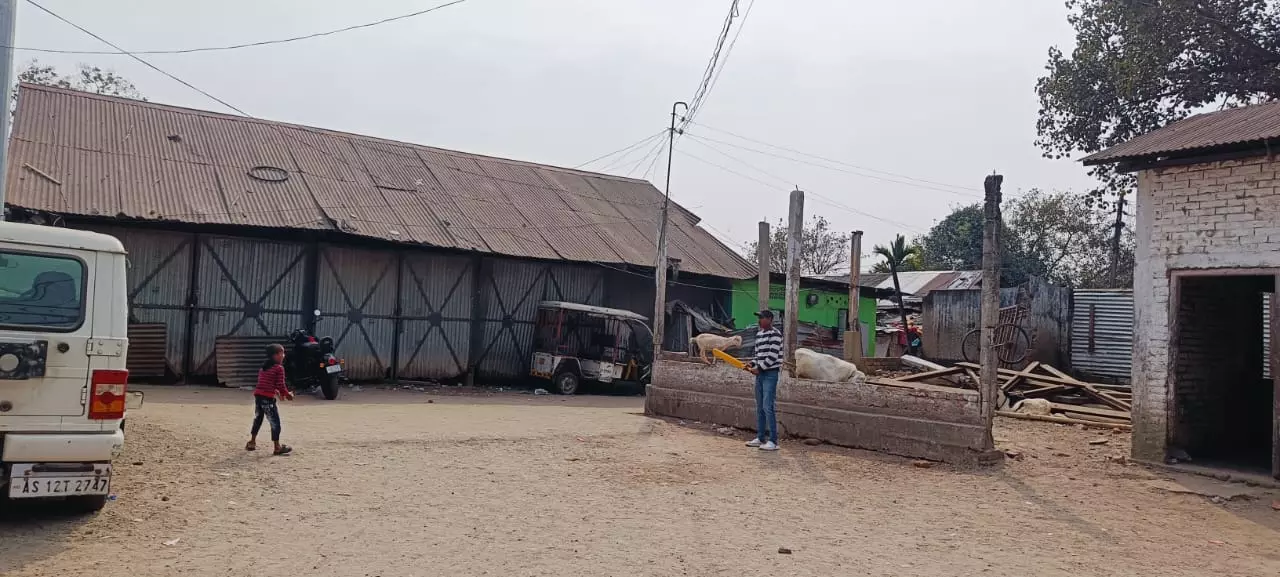
Two children play a game of cricket on a ground that leads to Tezpur's Harijan colony.
This activist also chose to remain anonymous and mentioned that after his organisation protested against the government indifference before the Lok Sabha elections in 2024, they have faced verbal threats from officials and political workers.
